Mysteries of Lisbon Blu-ray Movie
HomeMysteries of Lisbon Blu-ray Movie 
Mistérios de LisboaMusic Box Films | 2010 | 257 min | Not rated | Jan 17, 2012
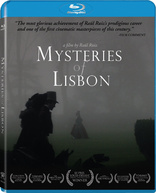
Movie rating
7.3 | / 10 |
Blu-ray rating
| Users | 0.0 | |
| Reviewer | 4.0 | |
| Overall | 4.0 |
Overview
Mysteries of Lisbon (2010)
Mysteries of Lisbon plunges us into a veritable whirlwind of adventures and escapades, coincidences and revelations, sentiments and violent passions, vengeance, love affairs, all wrapped in a rhapsodic voyage that takes us from Portugal to France, Italy, and as far as Brazil. In this Lisbon of intrigue and hidden identities, we encounter a series of characters all somewhat linked to the destiny of Pedro da Silva, orphan in a boarding school. Father Dinis, a descendent of the aristocratic libertines, later becomes a hero who defends justice, a countess maddened by her jealousy and set on her vengeance, a prosperous businessman who had mysteriously made his fortune as a bloodthirsty pirate; these and many more all cross in a story set in the 19th century and all searching for the true identity of our main character.
Starring: Adriano Luz, Maria João Bastos, Ricardo Pereira, Clotilde Hesme, Afonso PimentelDirector: Raúl Ruiz
| Foreign | Uncertain |
| Drama | Uncertain |
| Mystery | Uncertain |
Specifications
Video
Video codec: MPEG-4 AVC
Video resolution: 1080p
Aspect ratio: 1.95:1
Original aspect ratio: 1.85:1
Audio
Portuguese: DTS-HD Master Audio 5.1 (48 kHz, 16-bit)
Portuguese: DTS-HD Master Audio 2.0
Info taken from audio track found on disc, equipment/software shows 48kHz 16-bit when playing the DTS-HD MA 5.1 audio track
Subtitles
English
Discs
50GB Blu-ray Disc
Three-disc set (3 BDs)
Playback
Region free
Review
Rating summary
| Movie | 4.0 | |
| Video | 4.5 | |
| Audio | 4.0 | |
| Extras | 3.5 | |
| Overall | 4.0 |
Mysteries of Lisbon Blu-ray Movie Review
Pedro Twist.
Reviewed by Jeffrey Kauffman January 14, 2012If Charles Dickens were alive today, there’s little doubt he’d be churning out television miniseries with a novelistic flair
rather than “wasting” his time on the passé idiom of the actual novel. In fact, a cursory look at but a couple vestiges of
the
miniseries genre, PBS’ Great Performances and Masterpiece Theater, finds a slew of Dickens adaptations
stretching back decades. It
seems we can’t go more than year or two without a new Great Expectations, Oliver Twist, Bleak House or any
number of other iconic Dickens masterpieces. What makes Dickens’ oeuvre so seemingly perfectly adaptable for
screens, both large and small? Well, first of all, Dickens had the extraordinary ability to introduce a veritable gaggle of
idiosyncratic characters, develop a spider’s web of interconnectedness between them, and then let various plots play
out which might highlight any given character for an individual story arc. Dickens almost always had the gimmick of
having a relatively minor character introduced on, say, Page 47, return in the novel’s final moments to play a central
role, something that actually might be easier to immediately grasp when portrayed rather than when read, especially if
the casting is exceptional and that “bit role” has an actor who is memorable. There was also a certain none too subtle
subtext in several of Dickens’ works which posited a hopeful future for those born into (or at least raised in) the lower
classes, as Dickens loved to create denouements where underlings discovered they were actually better off than they
had ever imagined as a novel drew to its close. That was a populist approach that no doubt played to the erstwhile
dreams of Dickens’ large, probably mostly proletariat, audience back in his era, but which still retains a certain luster for
even middle class audiences today. And of course probably no other author of his time captured London in all its gritty,
class conscious “glamour” than Dickens.
Remove that “ond” from the middle of London and replace it with “isb” and
think about someone like Dickens locating a story in Portugal’s capital city rather than England’s, and you have at least
a fair idea of what awaits you in the labyrinthine Mysteries of Lisbon, a production which—you guessed it—
began life as a six hour miniseries but has here been whittled down to a relatively more manageable four or so hours
for theatrical exhibition. The film version has had a fairly widely varied critical response, from outright raves to sort of
middling appreciation to “what were they thinking?” incredulity, but there’s still a good chance it will be receiving at
least a couple of technical Oscar nominations in a couple of weeks, as it's being widely touted for its production design,
costumes, score and cinematography. Mysteries of Lisbon is a deliberately
slow, even languid, film that takes its time introducing a Dickensian gaggle of characters, including an Oliver Twist-
esque foundling who’s at the center of at least the first part of the story, and the film undeniably takes a certain
requisite amount of patience on the part of audiences to repay their required investment of time.
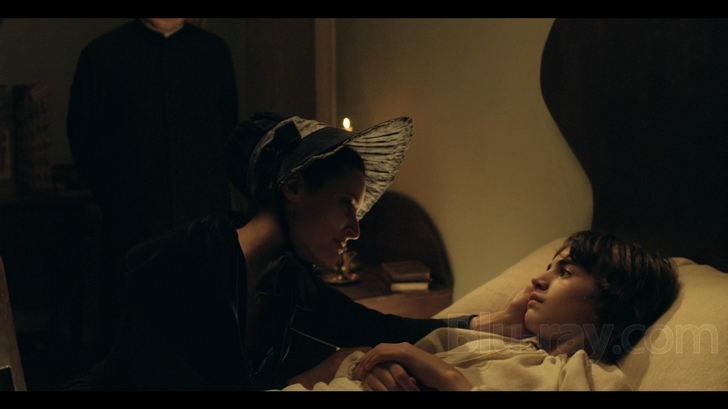
Those with at least a nodding acquaintance with sprawling epics like Visconti’s The Leopard may have an easier time slogging through Mysteries of Lisbon’s slow, deliberate examination of the lives of several intertwined characters in 19th century Lisbon, and in fact this film, the culmination of iconic Chilean director Raúl Ruiz’s long career (Ruiz died last year just as the production was wrapping), is a rather Visconti-esque rumination that wends its way through elaborately Baroque palatial settings while attempting to illuminate equally Baroque emotional lives of several characters. Mysteries of Lisbon is based on a famous mid-19th century novel by Portuguese author Camilo Castelo Branco, a man who churned out hundreds of novels but whose personal life could have been written by Dickens himself. Branco was born out of wedlock and orphaned as an infant, ended up doing jail time in his young adult life (once for exhuming the remains of his first wife), and ending life as a Viscount celebrated for his literary achievement. Branco’s works blend a sort of Dickensian romanticized realism with a sort of nascent quasi-magical realism that would later become the province of writer like Borges. Ruiz walks a rather precarious tightrope with these two disparate styles in his film, hinting at the “meta’ aspects of magical realism with a series of brief interstitials where any given scene is shown in brief as being played out on a little toy stage that is on a bureau in the room of the main character of the first section of the film.
That main character is Pedro (played by João Luis Arrais as a young lad), an orphan who is being raised in the local religiously supported orphanage by the stern but understanding Father Dinis (Adriano Luz). Pedro has no idea of who his parents may be, and Father Dinis is strangely reticent to tell the boy anything about his parentage. That all changes after Pedro is assaulted by some of the other boys in the orphanage and is suddenly visited by a local Countess, Angela (Maria João Bastos), who indeed turns out to be Pedro’s mother. That brief introduction sets a cartwheeling series of events into motion where both Angela and Father Dinis eventually spill a whole series of memories out to young Pedro, revealing lives of turmoil and repression, disguise and duplicity, all wrapped up in sequence after sequence of flashbacks which at times seem to stretch the filmic boundaries of “now” and “then.” (It’s no coincidence that one of Ruiz’s best remembered films is his adaptation of Proust, 1999’s Time Regained).
Despite its complexity and its multi-timeframe construction, Mysteries of Lisbon seems to be moving along relatively traditional narrative lines for the first half of the film. But when Part 2 starts, some viewers may be thrown for a loop as Ruiz darts off into a series of perhaps head scratching tangential storylines that are somewhat equivalent to that Dickensian trope of a minor character early in a novel suddenly assuming major importance much later in the story. In the case of Mysteries of Lisbon, however, some may question just how important at least one or two of these characters really are in the overall scheme of things. The film does eventually wend its way back around to Pedro, providing some long sought after answers for Pedro as well as some supporting characters. But this is a film which requires a more than usual amount of willingness to “go with the flow” on the part of the viewer, for Ruiz casts this film in a quasi-dreamlike state where one story dissolves into another, and even some characters morph into others as the story progresses.
This is a film which (again, very Visconti-like) does not give up its secrets easily, and which exists in a rarified, highly theatrical environment which frankly may not be to everyone’s taste. But for those who are willing to take a deep breath, exhale, and let the dreamlike ambience of the film wash over them like a warm Portuguese breeze, Mysteries of Lisbon provides some extremely compelling storytelling, along with some gorgeous imagery and an evocative soundtrack. This dream—like most dreams—may not exactly go where it might be expected to, but if getting there is half the fun, this is certainly a very worthwhile journey that delivers an unusually satisfying experience for those patient enough to let it work its own special magic.
Mysteries of Lisbon Blu-ray Movie, Video Quality 
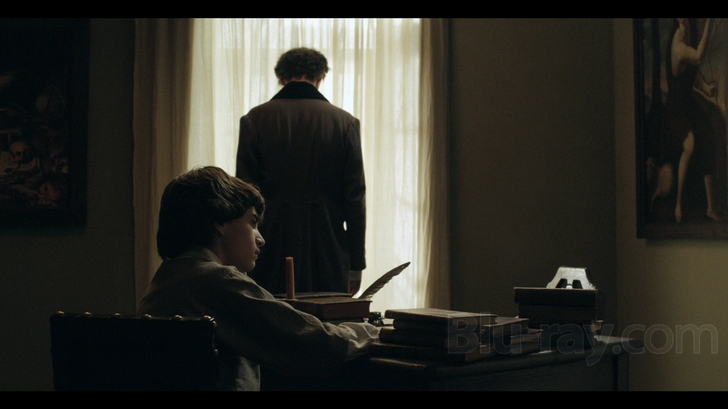
Mysteries of Lisbon is presented on Blu-ray courtesy of Music Box Films with an AVC encoded 1080p transfer in 1.95:1. This feature was shot digitally and obviously has undergone some fairly radical color timing, in fact desaturization, in post. As such, a lot of the time, the palette is intentionally subdued, creating a beautiful chiaroscuro look which verges on the monochromatic at times. The image here is sharp, although Ruiz loves to shoot in mist and fog or through veils, giving the film an ethereal, gauzy quality that may be mistaken for softness. There are a couple of artifacting issues present in this transfer, probably the most noticeable of which is persistent crush. So much of this film plays out in shadows, as if Ruiz were giving us a visual analog of a dream state, that shadow detail is more important than usual, and it suffers somewhat here, no doubt due to the post color timing, which has drained some of the gray scale out of the image. There is also transitory banding in some of the misty shots. Otherwise, though, this is a spectacular looking transfer within the intentional confines of what Ruiz and his DP André Szankowski were attempting to achieve.
Mysteries of Lisbon Blu-ray Movie, Audio Quality 
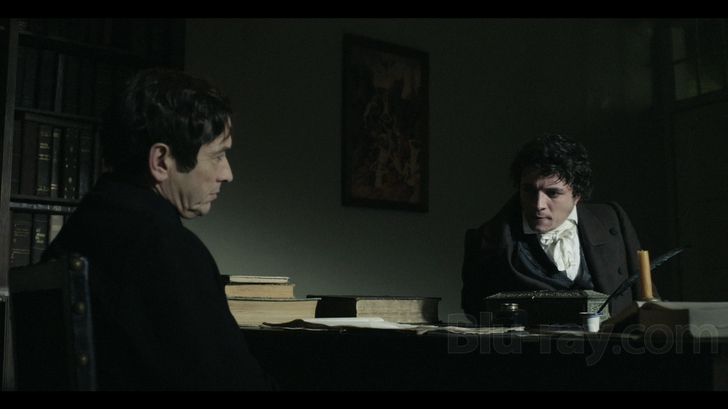
Mysteries of Lisbon's original Portuguese language track is offered here in both lossless DTS-HD Master Audio 5.1 and DTS-HD Master Audio 2.0 formats. Truth be told, there isn't a whale of a lot of difference between these tracks, for the bulk of this film is really spent in quiet— some would almost argue hushed—dialogue scenes with little chance for boisterous immersion. The 5.1 track does occasionally provide the discrete ambient environmental effect, but this is a resolutely front and center anchored soundtrack. The one exception is Jorge Arriagada's haunting score, which is in fact significantly opened up in the 5.1 track. All of this said, both tracks feature sterling fidelity, with dialogue well and cleanly presented, and dialogue, effects and music extremely well prioritized. There are some very minor, yet quite effective, bursts of LFE on the soundtrack courtesy of such effects as gunshots.
Mysteries of Lisbon Blu-ray Movie, Special Features and Extras 
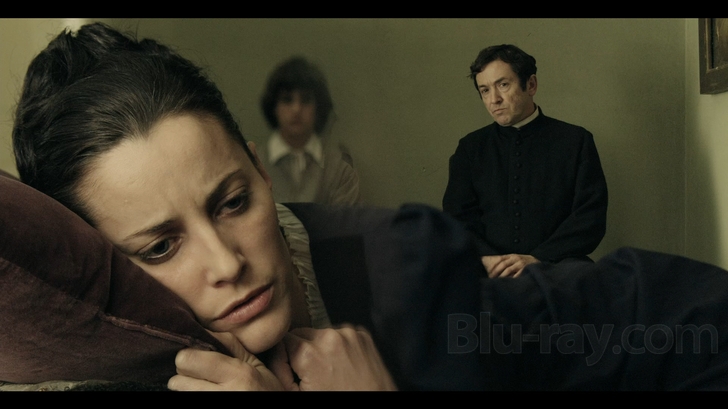
- Interview with Director Raúl Ruiz (SD; 37:24) is conducted by Frank Vallières, in French, with optional English subtitles, and covers quite a bit of ground including an overview of Ruiz's long career.
- Interview with Screenwriter Carlos Saboga (SD; 5:05) has the writer explaining how he adapted the gargantuan novel to the medium of film.
- Radio Interview with Director Raúl Ruiz (SD; 28:29) is an ostensible audio only supplement which features a picture of the director on a park bench for visuals. In French, with optional English subtitles.
- Critics Roundtable Discussion (SD; 13:21) starts with a nice recognition of composer Jorge Arriagada's contributions to the film (and to Ruiz's oeuvre in general) before branching out into an overall examination of the film and Ruiz's career. In French, with optional English subtitles.
- Novelist Camilo Castelo Branco (SD; 14:38) gives some background on the author, as well as how this story was originally printed (as a newspaper serial—shades of Dickens). This is one of the best featurettes on the supplements disc, with lots of interesting information.
- Original Theatrical Trailer (HD; 1:52)
Mysteries of Lisbon Blu-ray Movie, Overall Score and Recommendation 
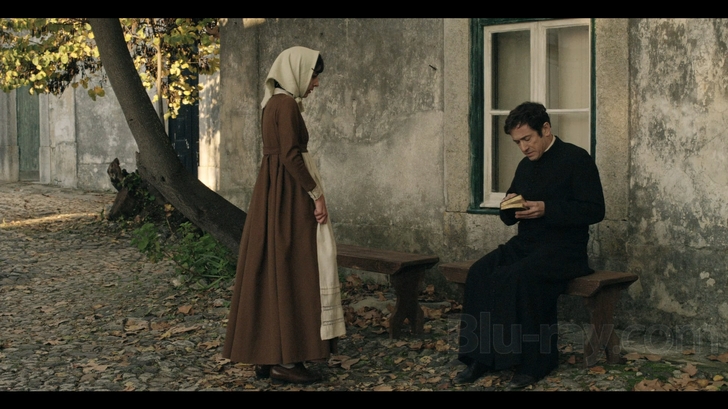
If you're a regular Art House denizen, you'll no doubt have an easier time relaxing into Mysteries of Lisbon's slow, steady pace than if you only frequent cinemas to see the latest summer blockbuster. This is an extremely introspective, meditative film that is akin to staring into a languid pool. At first it seems like nothing is happening, but the more you gaze, the more you start to see the submerged activity bustling just beneath the surface. This release might have been a bit better had the original miniseries version been included for comparison's sake, but this cut is extremely evocative and haunting. With overall superior video and audio quality, and some good supplements, Mysteries of Lisbon comes Highly recommended.
Similar titles
Similar titles you might also like

Les Miserables
I miserabili
1934

Children of Paradise
Les enfants du paradis
1945

Dheepan
2015

Zéro de conduite
Zero for Conduct
1933

24 Frames
2017

Heart of Glass
Herz aus Glas
1976

Woyzeck
1979

An Elephant Sitting Still
大象席地而坐 / Da xiang xi di er zuo
2018

Beyond the Hills
După dealuri
2012

Broker
브로커 / Beulokeo
2022

Tristana
1970

Cemetery of Splendor
2015

Babette's Feast
Babettes gæstebud
1987

Ordet
1955

The Spirit of the Beehive
El espíritu de la colmena
1973

Evil Does Not Exist
悪は存在しない
2023

Endless Poetry
Poesía sin fin
2016

Gabbeh
1996

The Rocket
2013

The Ballad of Narayama
Narayama bushikô
1983